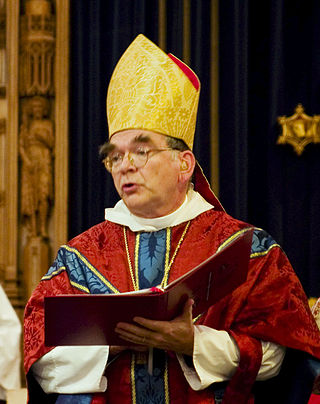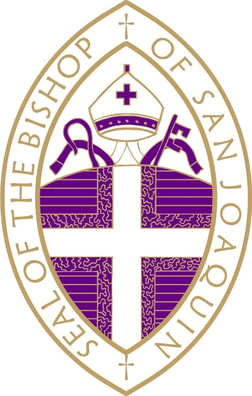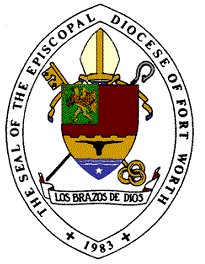The Anglican Communion Network was a theologically conservative network of Anglican and Episcopalian dioceses and parishes in the United States that was working toward Anglican realignment and developed into the Anglican Church in North America.

Robert William Duncan is an American Anglican bishop. He was the first primate and archbishop of the Anglican Church in North America (ACNA) from June 2009 to June 2014. In 1997, he was elected bishop of the Episcopal Diocese of Pittsburgh. In 2008, a majority of the diocesan convention voted to leave the diocese and the Episcopal Church and, in October 2009, named their new church the Anglican Diocese of Pittsburgh. Duncan served as bishop for the new Anglican diocese until 10 September 2016 upon the installation of his successor, Jim Hobby.

The Episcopal Church in North Texas was a diocese of the Episcopal Church from 1982 to its merger with the Diocese of Texas in 2022. The diocese included a geographic area of 24 counties in the north central part of Texas. As of 2021, it includes 13 churches, including a number of other congregations in the process of reorganization. The jurisdiction was the site of a major schism in 2008. This schism was the result of the diocese's bishop, Jack Iker, leading the majority of clergy and parishes to join the Anglican Church of North America as the Episcopal Diocese of Fort Worth. The Episcopal Church diocese is headquartered in Fort Worth, Texas. It announced on April 22, 2022, that it would seek reunion with the Episcopal Diocese of Texas. The merger was finalized by the 80th General Convention of the Episcopal Church in the United States of America on July 11, 2022.

The Anglican Province of America (APA) is a Continuing Anglican church in the United States. The church was founded by former members of the Episcopal Church in the United States.

The Anglican Church of South America is the ecclesiastical province of the Anglican Communion that covers six dioceses in the countries of Argentina, Bolivia, Paraguay, Peru, and Uruguay.

The Episcopal Diocese of Pittsburgh is a diocese in the Episcopal Church in the United States of America. Geographically, it encompasses 11 counties in Western Pennsylvania. It was formed in 1865 by dividing the Episcopal Diocese of Pennsylvania. The diocesan cathedral is Trinity Cathedral in downtown Pittsburgh. The Rt. Rev. Ketlen A. Solak was consecrated and seated as its current bishop in autumn 2021.
In the United States, the history of the Episcopal Church has its origins in the Church of England, a church which stresses its continuity with the ancient Western church and claims to maintain apostolic succession. Its close links to the Crown led to its reorganization on an independent basis in the 1780s. In the nineteenth and early twentieth centuries, it was characterized sociologically by a disproportionately large number of high status Americans as well as English immigrants; for example, more than a quarter of all presidents of the United States have been Episcopalians. Although it was not among the leading participants of the abolitionist movement in the early 19th century, by the early 20th century its social engagement had increased to the point that it was an important participant in the Social Gospel movement, though it never provided much support for the Prohibitionist movement. Like other mainline churches in the United States, its membership decreased from the 1960s. This was also a period in which the church took a more open attitude on the role of women and toward homosexuality, while engaging in liturgical revision parallel to that of the Roman Catholic Church in the post Vatican II era.
The Anglican realignment is a movement among some Anglicans to align themselves under new or alternative oversight within or outside the Anglican Communion. This movement is primarily active in parts of the Episcopal Church in the United States and the Anglican Church of Canada. Two of the major events that contributed to the movement were the 2002 decision of the Diocese of New Westminster in Canada to authorise a rite of blessing for same-sex unions, and the nomination of two openly gay priests in 2003 to become bishops. Jeffrey John, an openly gay priest with a long-time partner, was appointed to be the next Bishop of Reading in the Church of England and the General Convention of the Episcopal Church ratified the election of Gene Robinson, an openly gay non-celibate man, as Bishop of New Hampshire. Jeffrey John ultimately declined the appointment due to pressure.
The Anglican Diocese of San Joaquin (ADSJ) is a diocese in the Anglican Church in North America (ACNA). It came into being after a majority of congregants in the Episcopal Diocese of San Joaquin separated from the Episcopal Church in 2007. Prior to the separation, the Episcopal Church diocese was one of the most conservative in the church, and one of three that did not ordain women. The Anglican diocese is now headquartered in Fresno. The pre-separation diocese had a membership of approximately 8,500.

The Anglican Church in North America (ACNA) is a Christian denomination in the Anglican tradition in the United States and Canada. It also includes ten congregations in Mexico, two mission churches in Guatemala, and a missionary diocese in Cuba. Headquartered in Ambridge, Pennsylvania, the church reported 977 congregations and 124,999 members in 2022. The first archbishop of the ACNA was Robert Duncan, who was succeeded by Foley Beach in 2014.

The Episcopal Diocese of San Joaquin (EDSJ) is a diocese of the Episcopal Church (TEC), located in central California with its headquarters in Fresno. It can trace its roots back to the earliest days of American settlement in California.
The Bartonville Agreement came from a meeting held in May 1999 by bishops representing both the Anglican Communion's American province and a number of Continuing Anglican jurisdictions in North America. As such, it was an early effort made by conservative Episcopal bishops and Continuing Anglican bishops to voice a common set of principles which might become the basis of future cooperation between their churches or dioceses. The schism that had divided these church bodies had occurred in 1977 at the Congress of St. Louis when "Continuers" met and formed a new Anglican church in reaction to changes in doctrine and practice that had been approved by the Episcopal Church and the Anglican Church of Canada.

The Diocese of Quincy was a diocese of the Episcopal Church in western Illinois from 1877 to 2013. The cathedral seat was originally in Quincy, Illinois but was moved to St. Paul's Cathedral in Peoria in 1963. In order to avoid confusion with the Roman Catholic Diocese of Peoria, the diocese retained the name of the location of its original "home" city, Quincy, where its cathedral seat was St. John's.

The Episcopal Diocese of Fort Worth is a diocese of the Anglican Church in North America. The diocese comprises 56 congregations and its headquarters are in Fort Worth, Texas.
Edward Harding "Ed" MacBurney SSC was an American Anglican bishop. He was born in Albany, New York to Alfred Cadwell MacBurney (1896-1986) and Florence Marion McDowell MacBurney (1897-1989). A graduate of Dartmouth College, Berkeley Divinity School, and St Stephen's House, Oxford, he was ordained to the priesthood in December 1952 by the Church of England Bishop of Ely Edward Wynn. He served in the Episcopal Diocese of New Hampshire at Trinity Episcopal Church, Hanover, from 1953 to 1973 before appointment as dean of Trinity Episcopal Cathedral in Davenport, Iowa from 1973 to 1987. MacBurney served from 1988 to 1994 as the seventh bishop of the Episcopal Diocese of Quincy. During the consents process following MacBurney's election, Bishop John Shelby Spong of the Episcopal Diocese of Newark "urged his fellow liberal bishops to encourage their diocesan standing committees to confirm Dean MacBurney's election for the sake of the catholicity of the Church."

Juan Alberto Morales is a Puerto Rican Anglican bishop. He is bishop of the Anglican Diocese of Quincy in the Anglican Church in North America. He was enthroned on September 18, 2010.
Héctor "Tito" Zavala Muñoz is a Chilean Anglican bishop. He was the first native Bishop of the Anglican Diocese of Chile and later the first Latin American Presiding Bishop of the Anglican Church of the Southern Cone of America, renamed in 2014 as the Anglican Church of South America. When the new Anglican Church of Chile was inaugurated in 2018 he became its first Presiding Bishop, also known as Archbishop by the Anglican Communion News Service. He is married to Miriam and they have three adult children.

The Anglican Church of Chile is the ecclesiastical province of the Anglican Communion that covers four dioceses in Chile. Formed in 2018, the province is the 40th in the Anglican Communion. The province consists of four dioceses. Its primate and metropolitan is the Archbishop of Chile, Héctor Zavala.

St. Vincent's Cathedral is an Anglican church in Bedford, Texas. It is the cathedral of the Episcopal Diocese of Fort Worth. The cathedral played a major part in the Anglican realignment by hosting the inaugural assembly in 2009 where the Anglican Church in North America was constituted.
The Anglican Network in Europe (ANiE) is a small Christian denomination in the Anglican tradition with churches in Europe. Formed as part of the worldwide Anglican realignment, it is a member jurisdiction of the Global Fellowship of Confessing Anglicans (GAFCON) and is under the primatial oversight of the chairman of the GAFCON Primates Council. ANiE runs in parallel with the Free Church of England (RECUK). GAFCON recognizes ANiE as a "proto-province" operating separately from the Church of England, the Scottish Episcopal Church, the Church in Wales and other Anglican Communion jurisdictions in Great Britain and the European continent. ANiE is the body hierarchically above the preexisting Anglican Mission in England; the former is the equivalent of a province whilst the latter is a convocation, the equivalent of a diocese.












